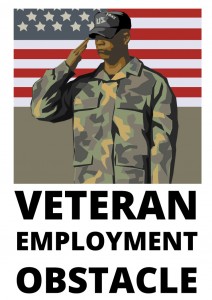 Since 9/11 the total number of disabled veterans increased by 25 percent. 2.9 million former military members suffer from a service related disability. A far greater sum when viewed through the scope that the toll combat takes often falls outside of physical injury. In 2012, according to The Department of Veterans Affairs, 30 percent of combat vets who received treatment at a VA hospital were suffering from post traumatic stress disorder. That figure is high, it is assuredly higher when the amount of veterans who do not get diagnosed or receive treatment is taken into account.
Since 9/11 the total number of disabled veterans increased by 25 percent. 2.9 million former military members suffer from a service related disability. A far greater sum when viewed through the scope that the toll combat takes often falls outside of physical injury. In 2012, according to The Department of Veterans Affairs, 30 percent of combat vets who received treatment at a VA hospital were suffering from post traumatic stress disorder. That figure is high, it is assuredly higher when the amount of veterans who do not get diagnosed or receive treatment is taken into account.
The transition from warrior to civilian is incredibly daunting for many. Service related disability and PTSD only present a portion of the problem. Rates of veteran homelessness are distressingly high. Approximately 33 percent of homeless men in this country are veterans, with an estimated 529,000-840,000 veterans living on the street at some point or another during the course of the year.
The transition from active duty to non-combatant is eased by the presence of stability. Employment is generally the cornerstone of steadiness. Though many organizations claim the veteran unemployment rate is vastly underreported, the widely accepted number is 7.6 percent. Although this figure is below the national average, it is still far too high. For their selfless contributions, made in support of the entire country, it should be among our nation’s most pressing priorities to ensure every veteran is presented with solid employment opportunities. Under-employment is equally unacceptable and an expectation should exist that those with specific abilities will have their skills matched with the right employer.
Unfortunately, a gulf seemingly exists between the talents possessed by veterans and the belief that these proficiencies do not translate to the corporate world among employers. In 2012, CNAS, a think tank based out of Washington DC, interviewed representatives of 69 different companies in an attempt to understand the mindset of those interviewing veterans for employment. These interviews illustrated a gap in knowledge from employers in regards to how military experience could be an asset to a company.
Over 80 percent of respondents cited incompatible skills and sub-par explanation from service members as to how their skills would be relevant in business. Functioning as an additional road block is the stigmatization media portrayals of PTSD cause veterans. Many of the employers interviewed reported trepidation over hiring a military member for fear of a psychological breakdown. A full 25 percent of respondents “struggled to find veterans to hire.”
These findings are distressing. Military service requires discipline, loyalty, leadership and decisive action, traits that are often called ideal by companies in search of potential employees. President Barak Obama said it best when stated “Think about how many veterans have led their comrades on life-and-death missions by the time they were 25 years old. That’s the kind of responsibility and experience business in America should want to take advantage of.”
